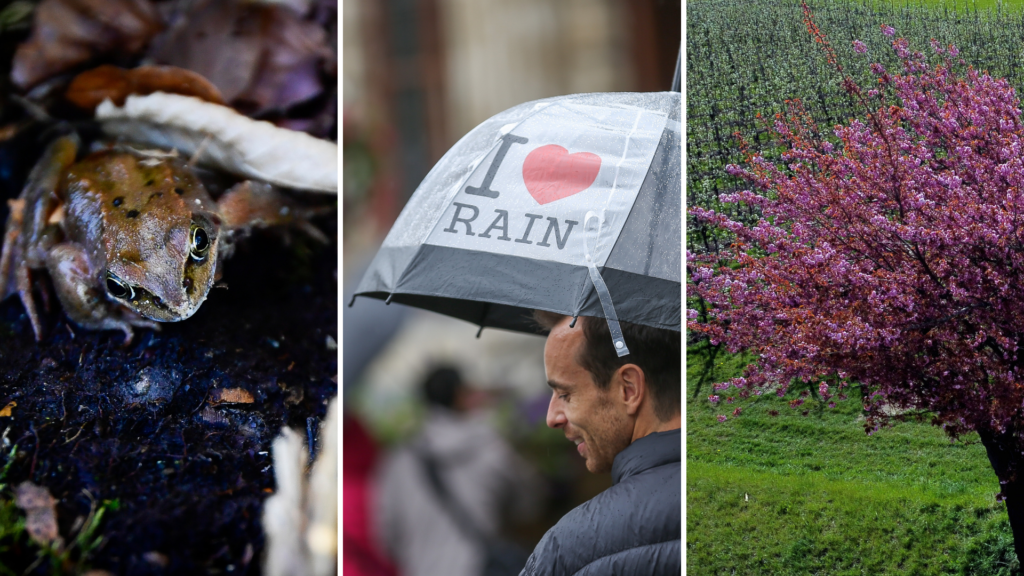The saying "It's nice weather for ducks" perfectly sums up the past few months in Belgium, but the heavy rainfall is doing wonders for the fauna and flora, while also ensuring better protection against drought.
Excluding the rare sunny Saturday just over a week ago, spring in Belgium so far has been disappointing at best. It comes on the heels of the wettest autumn and winter the country, renowned for its damp conditions, has seen since 1970.
This has been to the great sadness of people living in the country, who with the smallest glimpse of sunshine, have been rushing out en masse to enjoy the rare dry spell.
However, the string of wet weather has not been bad news for everyone. From recovered groundwater levels to sprouting gardens and revived animals, for some, the endless rain is a blessing.
'Record-high' groundwater levels
In the past three months, 264.4 mm of precipitation has been recorded on average, about 132% of the climatological normal. The main benefit of the incessant rainfall has been the boosting of groundwater levels.
"Groundwater levels are indeed high," Katrien Smet of the Flemish Environment Agency (VMM) told The Brussels Times. In 98% of the monitoring sites, normal, high to very high groundwater levels for the time of year have been recorded. "The last time the level was this high in mid-April was in 2001."

Critically low groundwater levels in a Flemish river. Credit: Belga/ Nicolas Maeterlinck
This news comes as a relief as levels have been problematically low for several years, resulting in Belgium heading for structural water scarcity.
Since 2018, Flanders has faced severe drought every summer. At the beginning of April 2022, the percentage of high to very high groundwater levels hovered below 30%. That summer, the situation endangered the most vulnerable plant species, resulted in major crop damage, proved disastrous for Belgian waterways and saw fish dying in rivers and streams.
While there is now an adequate supply, and Flanders will not start the drier summer months with a backlog, Smet said water resources should not be wasted now. "It is difficult to estimate whether we might face drought this summer. If it stays dry for weeks and temperatures start climbing, we are still going to need that water badly."
Smet did add that water retention has been improved due to the Blue Deal (the Flemish flood and drought management policy).
The excess rainfall will also help reduce the risk of heatwaves, Smet noted, as when the sun shines on wet soil, the heat evaporates rather than being stored in the ground.
Thriving life
The abundance of rain is also good news for gardens and forests – as well as for wild plants and animals.
The wet conditions turn gardens into a kind of "soggy mat" and allow soil life to rebound. Especially the awakening of earthworms is a benefit here, as they can move much better in wet soil, helping them dig horizontal and vertical corridors through which rainwater can infiltrate. When it is dry, this helps keep gardens resistant to drying out for longer.
This excess water also provides a huge boost to most greenery, and the roots of plants suck themselves full of water, which is especially needed after periods of drought. Heavy rainfall also helps the salts in fertilisers to wash away.
Meanwhile, plant species such as ferns, fens and spring mushrooms are thriving under the current wet conditions, while tree species that suffered a lot from heat stress in recent years, such as the beech, are revived.
Related News
- Cold rainy week before temperatures rise next weekend
- Forest management: Numerous local authorities renew their plans in 2024
- 'Nature close to home': Brussels calls on residents to make the capital greener
Biologist Wim Veraghtert (Natuurpunt) told De Morgen that animals too are burgeoning. For example, the heavy rainfall provides water birds that usually linger in pools and swamps with additional suitable habitats. The population of meadow birds and waders are also picking up as worms and other critters hiding in the soil are now easier to catch.
Finally, rain is also a matter of life and death for amphibians, and an abundance of it ensures the pools where they lay their larvae of frogs and salamanders remain wet rather than drying out.

